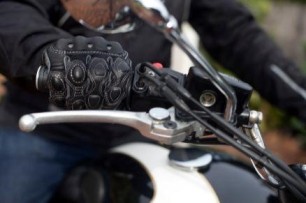Blog Details - Magma HDI

Learn how to control your bike on slippery roads or slopes 31st January 2022
While riding a bike, it is necessary to know when to apply the rear or the front brakes. Randomly using both or either of them could lead to an accident.
Factors like maintaining your balance while driving or taking turns hold significant importance. Many people know how to ride a bike, but not everyone may be sure about controlling the bike in severe circumstances on the road. All you need is a little practice with a set of instructions to follow, and you're safe to go.
For now, we'll focus on how you can control your bike on slippery roads. This is because not everyone knows how to manage their balance, maintain a stable speed, and apply brakes on wet or slippery roads.
1. Brake force:
While you're driving on any conditional road, it is necessary to know all the braking techniques beforehand. For example, if you're driving at 20-30 miles per hour, you can use the rear brake and apply the same. But, it would help if you pressed it gently without much pressure. Applying too much pressure may cause you to end up slipping on the road.
Slippery roads are unsafe for driving. No matter what speed you're driving at, you can apply both brakes at the same time but with the same amount of pressure. However, pressing either one with higher intensity than the other could be risky.
2. Tyre gripping:
This is not well-known among most bike riders, but it is as important as knowing the braking system. A tyre should have a good number of treads to provide you control over slippery roads. So always make sure to check the grip of the tyres.
If the tyre does not have enough grip and treads, there won't be a layer of protection from the water on the road. A smooth surface can make your tyre straight flat and drastically increase the chances of slipping. Do not forget to check for any punctures or cuts on the tyre before heading for your trip.
3. Speed limit:
Many accidents occur because of the driver's negligence towards the speed limits. Managing the overall balance and speed in a car is different from bikes. If you want to stop or slow down, apply either or both brakes with equal pressure. Never slow down instantly. Leave the throttle and apply the brakes only after that.
4. Chain of the bike:
When you're driving on a wet or slippery road, the life of the chain could easily get affected by junk or jamming. In addition, if the chain is not oiled regularly, it could get loose and come off the socket. Hence, ensure to oil the chain regularly.
Driving on slippery or uneven roads can be tricky, so having bike insurance to protect you in any situation is essential. In addition, bike insurance will guarantee financial assistance in case of any damage to your vehicle and help you rest assured. With the tips mentioned above, enjoy your ride in the rain! Drive safe!
Click HERE to buy ideal bike insurance.
Disclaimer: The information provided above is for illustrative purposes only. To get more details, please refer to policy wordings and prospectus before purchasing a policy.

